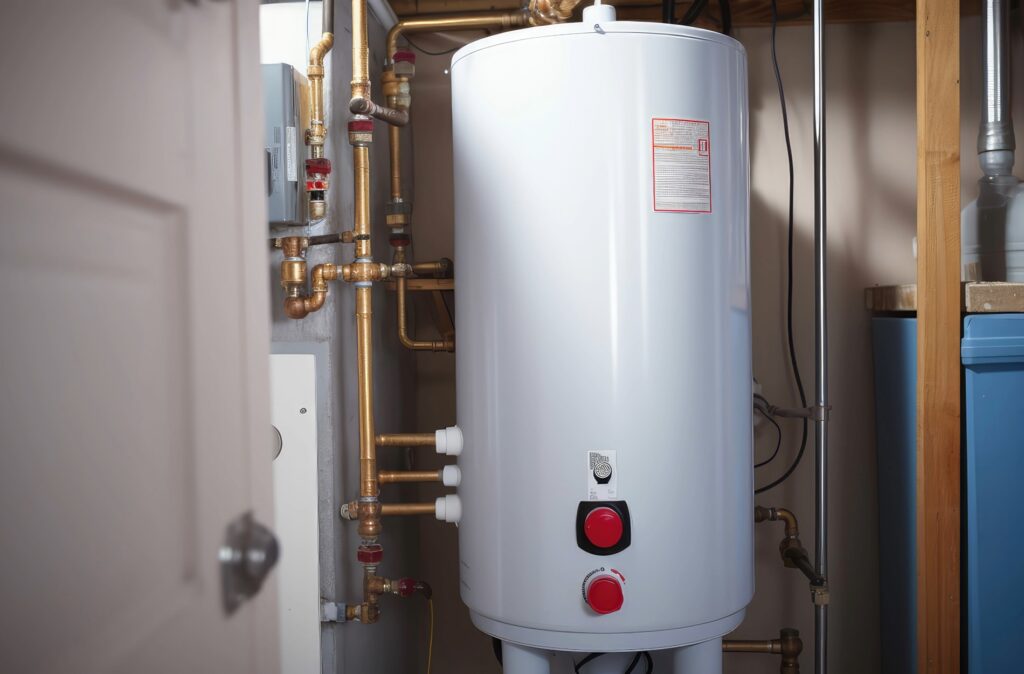Types of Water Heaters and Their Advantages
Choosing the right water heater is essential for the comfort and efficiency of your home. With various types of water heaters available, understanding their advantages can help you make an informed decision. Each type of water heater comes with its own set of benefits, whether you prioritize energy efficiency, space-saving, or long-term savings.

Tankless Water Heaters: Efficiency and Space-Saving Benefits
Tankless water heaters are becoming increasingly popular for their efficiency and space-saving qualities. Unlike traditional water heaters, tankless models do not store hot water. Instead, they heat the water on demand as it flows through the unit. This means there is no need for a large storage tank, freeing up valuable space in your home.
One of the main advantages of tankless water heaters is their energy efficiency. Because these systems heat water only when it is needed, they avoid the standby energy losses associated with traditional storage tank water heaters. This can lead to significant savings on your energy bills over time.
Furthermore, tankless water heaters provide a continuous supply of hot water. You won’t run out of hot water during a shower or while washing dishes, as long as the unit is properly sized for your household’s needs. Our professionals can help determine the right size and model for your home, ensuring optimal performance.
Traditional Storage Tank Water Heaters: Reliability and Accessibility
Traditional storage tank water heaters have been a staple in homes for many years. These systems continuously store and heat a large volume of water, typically between 20 to 80 gallons. This makes them reliable for households that have regular hot water needs, whether it’s for bathing, cooking, or cleaning.
One of the key advantages of traditional storage tank water heaters is their accessibility. They are widely available and come in various sizes to fit different homes and budgets. Installation can be straightforward, and our technicians are skilled in performing water heater installation efficiently.
However, it’s essential to recognize that traditional water heaters require regular maintenance, including flushing the tank to remove sediment build-up and checking the anode rod to prevent corrosion. These maintenance tasks can extend the life of your water heater and improve its efficiency. If any issues arise, our water heater repair services are available to address problems swiftly and professionally.
Traditional storage tank water heaters also have the benefit of being compatible with various water filtration and water softener systems. These additions can improve the quality of your hot water, protect your plumbing, and enhance the lifespan of your water heater.
Heat Pump Water Heaters: Energy-Efficient Solutions
Heat pump water heaters are an innovative solution that offers energy efficiency for your home. Unlike traditional water heaters that generate heat directly, heat pump water heaters move heat from the air or ground into the water. This process makes them much more efficient than conventional electric water heaters.
One of the main advantages of heat pump water heaters is their energy-saving capability. By relying on ambient heat, these units use less electricity to heat the water, translating to lower energy bills over time. They are especially effective in moderate to warm climates, where the ambient temperature is suitable for heat transfer.
Another benefit of heat pump water heaters is their compatibility with other systems, such as water filtration and water softeners. Our technicians can integrate these systems to ensure you have clean, soft water that’s also heated efficiently. Heat pump water heaters typically have higher upfront costs, but their long-term energy savings can offset the initial investment.
Solar Water Heaters: Harnessing Renewable Energy
Solar water heaters are an excellent choice for those looking to harness renewable energy. These systems use solar panels to absorb sunlight and convert it into heat, which is then transferred to the water in your tank. Solar water heaters can significantly reduce your reliance on fossil fuels and lower your utility bills.
One of the major advantages of solar water heaters is their environmental impact. By using a renewable energy source, these systems help reduce greenhouse gas emissions and your home’s carbon footprint. Solar water heaters also work well with existing water filtration and water softener systems, ensuring your hot water is both clean and efficient.
Solar water heaters come in different configurations, including active and passive systems. Active systems use pumps to circulate water, while passive systems rely on natural convection. Each type has its benefits, and our professionals can help you choose the best system for your home. Although the installation cost can be higher, the long-term savings and environmental benefits make solar water heaters a worthwhile investment.
Conclusion
Selecting the right type of water heater involves considering various factors, including energy efficiency, space requirements, and long-term savings. From the space-saving tankless water heaters to the renewable energy of solar water heaters, each option offers unique benefits that cater to different needs and preferences.
Our professionals at Texas Quality Plumbing are here to provide expert guidance on choosing and installing the perfect water heater for your home. Proper installation and regular maintenance are crucial for maximizing the efficiency and lifespan of your water heater. Investing in the right water heater can ensure you have a reliable and energy-efficient hot water supply for years to come.
If you need assistance with water heaters in Richmond or have any questions about the different types of water heaters, don’t hesitate to contact us. Our experienced technicians are ready to help you make the best choice for your home’s hot water needs. Call us today to schedule a consultation or service appointment.

